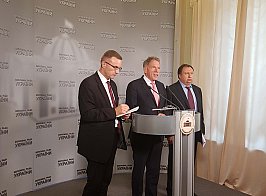International activity
The Chair of the Committee on Ukraine’s Integration into the EU addressed the III Youth Model of the NATO Parliamentary Assembly
Ivanna Klympush-Tsintsadze said that it was symbolic that the final
meeting of this assembly took place immediately after the spring session
of the NATO PA in Luxembourg, in which the Ukrainian parliamentary
delegation participated. “We can report on good, positive news. Another
ambitious resolution was adopted, which for the first time mentions the
genocide of the Ukrainian people, carried out by the Russian Federation
through the forcible deportation of children. Also, for the first time in
an international document, apart from historical studies, the condemnation
of the policy of the Russian regime as ruscism is used,” said the Chair of
the Committee.
The most important point, according to her, is that in this resolution the
MPs of the NATO member countries call on their governments to make already
in Vilnius a decision that would determine the next steps on Ukraine's
path to the Alliance. Although the decisions of the NATO Parliamentary
Assembly are purely advisory, the NATO Parliamentary Assembly defines the
political standard to which governments must heed. “Members of the
democratic parliaments are the people who represent citizens. And in
democracies, governments are obliged to listen to parliaments. This does
not mean that they have to do exactly what the assembly proposed, but they
should take into account the political will of the representatives of the
citizens of various member countries of the Alliance,” commented Ivanna
Klympush-Tsintsadze on the adopted declaration of the NATO PA.
Regarding the upcoming summit of the Alliance in Vilnius, in July this
year, the Chair of the Committee stated that Ukraine hopes for an
invitation to NATO during this event. “We believe that we deserve it. We
are sure that the Alliance made a mistake at the Bucharest Summit in 2008
when it did not provide Georgia and Ukraine with the Membership Action
Plan,” she said. At the same time, Ivanna Klympush-Tsintsadze noted that
today, unfortunately, there is no consensus on inviting Ukraine to NATO at
the Vilnius summit. “There is a common vision, and its specific details
are being discussed, regarding how to introduce additional tools to our
cooperation and interaction with the Alliance. This means the
strengthening of the comprehensive assistance package. It is possible –
and this would be an ambitious step – that the format of the Ukraine-NATO
Commission will transfer to the format of the Ukraine-NATO Council.
Ukraine also should be involved in additional formats of presence in the
Alliance — in the headquarters or in the military leadership of the
Alliance. However, these instruments are not enough for us Ukrainians. I
would like to see a political solution already in Vilnius,” said the Chair
of the Committee. This decision, in her opinion, should specify in what
way Ukraine should move towards NATO membership. This should be the path
that Finland and Sweden are currently taking. “So, after the end of this
war, we would become a member of the Alliance. There would be no lasting,
reliable, sustainable peace in Europe without Ukraine in NATO. And this is
our task, together with you, to convey this argument to our partners,”
Ivanna Klympush-Tsintsadze concluded.

